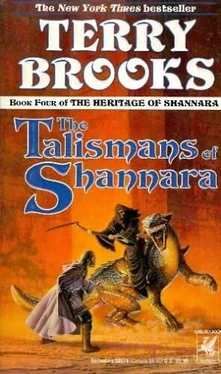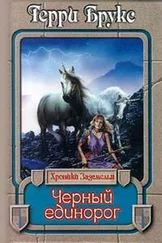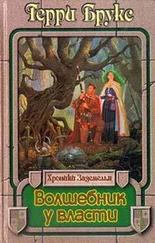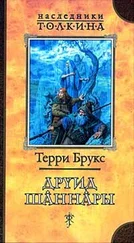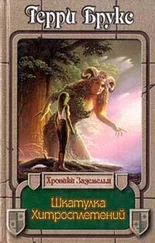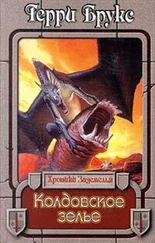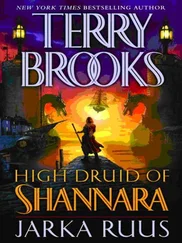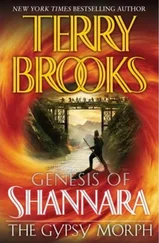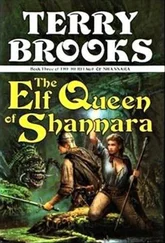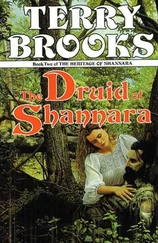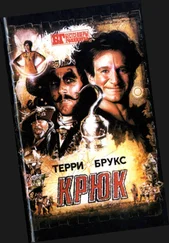“So what did you learn tonight?” he asked, half joking. “Anything useful?”
She gave him a cool stare. “I’ve decided to trust you,” she announced.
His smile faded. “Thanks.”
“Because if you’re not who you say you are, then you are the worst Federation spy I’ve ever seen.”
He folded his arms defensively. “Forget the thanks. I take it back.”
“There is a rumor,” she said, “that the Federation have captured Padishar at Tyrsis.” Morgan went still. The cobalt eyes stayed fastened on him. “It had something to do with a prison break. I overheard a Federation commander talking about it. They claim to have him.”
Morgan thought about it a moment. “Padishar’s hard to trap. Maybe a rumor is all it is.”
She nodded. “Maybe. It wasn’t so long ago that they claimed to have killed him at the Jut. They said the Movement was finished.” She paused. “In any case, we’ll learn the truth at Fire-rim Reach.”
“We’re going?” Morgan asked quickly.
“We’re going.” She rose. “Help me pack some food. I’ll get us some blankets. We’ll slip away before it gets light, ft will be better if we aren’t seen leaving.”
He stood up with her and moved over to the pantry. “What about the tavern?” he asked. “Doesn’t someone have to look after it?”
“The tavern will stay closed until I return.”
He glanced up from stuffing a loaf of bread into a sack. “You lied to me, didn’t you? You are the owner.”
She met his gaze and held it. “Try not to be so stupid, Highlander. I didn’t lie to you. I’m the manager, not the owner. The owner is Padishar Creel.”
They finished putting together supplies and sleeping gear, strapped everything across their backs, and went out the back door into the night. The air was warm and filled with the smells of the city as they hurried down empty streets and alleyways, keeping close watch for Federation patrols. The girl was as silent as a ghost, a knife-lean figure cutting smoothly through the building shadows. Morgan noticed that she wore the sword she’d kept hidden beneath the counter, the narrow blade strapped across her back beneath her other gear. He wondered, rather unkindly, if she’d brought her broom. At least her odd shoes were gone, replaced by more serviceable boots.
They passed from the city into the land beyond and marched north to the Mermidon where they crossed at a shallows and turned east. They followed the line of the Dragon’s Teeth, and by daybreak they were traveling north again across the Rabb. They walked steadily until sunset, pausing long enough at midday to eat and to wait out the worst of the afternoon heat. The plains were dusty and dry and empty of life, and the journey was uneventful. The girl spoke little, and Morgan was content to leave things that way.
At sunset they made camp close against the Dragon’s Teeth beside a tributary of the Rabb, settling themselves in a grove of ash that climbed into the rocks like soldiers on the march. They ate their evening meal as the sun disappeared behind the mountains, its hazy mix of red and gold melting across the plains and sky. When they were finished, they sat watching the dusk deepen and the river’s waters turn silver in the light of the moon and stars.
“Padishar told me you saved his life,” the girl said after a time.
She hadn’t spoken a word all through dinner. Morgan looked over, surprised by the suddenness of the declaration. She was watching him, her strange blue eyes depthless.
“I saved my own in the bargain,” he replied, “so it wasn’t an entirely selfless act.”
She folded her arms. “He said to keep watch for you and to take good care of you. He said I’d know you when I saw you.”
Her expression never changed. Morgan grinned in spite of himself. “Well, he makes mistakes like everyone else.” He waited for a response and, when there was none, said, a bit huffy, “You may not believe this but I can take pretty good care of myself.”
She looked away, shifting to a more comfortable position. Her eyes gleamed in the starlight. “What is it like where you come from?”
He hesitated, confused. “What do you mean?”
“The Highlands, what are they like?”
He thought for a moment she was teasing him, then decided she wasn’t. He took a deep breath and stretched out, remembering. “It is the most beautiful country in the Four Lands,” he said, and proceeded to describe it in detail—the hills with their carpets of blue, lavender, and yellow grasses and flowers, the streams that turned frosty at dawn and blood-red at dusk, the mist that came and went with the changing seasons, the forests and the meadows, the sense of peace and timelessness. The Highlands were his passion, the more so since his departure weeks earlier. It reminded him again how much home meant to him, even a home that was really no longer his now that the Federation occupied it—though in truth, he thought, it was still more his than theirs because he kept the feel of it with him in his mind and its history was in his blood and that would never be true for them.
She was silent for a time when he finished, then said, “I like how you describe your home. I like how you feel about it. If I lived there, I think I would feel the same.”
“You would,” he assured her, studying the profile of her face as she stared out across the Rabb, distracted. “But I guess everyone feels that way about their home.”
“I don’t,” she said.
He straightened up again. “Why not?”
Her forehead furrowed. It produced only a slight marring of her smooth features but gave her an entirely different look, one at once both introspective and distant. “I suppose it’s because I have no good memories of home. I was born on a small farm south of Varfleet, one of several families that occupied a valley. I lived there with my parents and my brothers and one sister. I was the youngest. We raised milk cows and grain. In summer, the fields would be as gold as the sun. In fall, the earth would be all black after it was plowed.” She shrugged. “I don’t remember much other than that. Just the sickness. It seems a long time ago, but I guess it wasn’t. The land went bad first, then the stock, and finally my family. Everything began to die. Everyone. My sister first, then my mother, my brothers, and my father. It was the same with the people who lived on the other farms. It happened all at once. Everyone was dead in a few months. One of the women on the other farms found me and took me to Varfleet to live with her. We were the last. I was six years old.”
She made it all sound as if it were nothing out of the ordinary. There was no emotion in her voice. She finished and looked away. “I think there might be some rain on the way,” she said.
They slept until dawn, ate a breakfast of bread, fruit, and cheese, and began their trek north again. The skies were clouding when they woke, and a short time after they crossed the Rabb it began to rain. Thunderheads built up, and lightning streaked the blackness. When the rain began to come down in torrents, they took shelter in the lee of an old maple set back against a rocky rise. Brushing water from their faces and clothes, they settled back to wait out the storm. The air cooled slightly, and the plains shimmered with the damp.
Shoulder to shoulder, they sat with their backs against the maple, staring out into the haze, listening to the sound of the rain.
“How did you meet Padishar?” Morgan asked her after they had been quiet for a time.
She brought her knees up and wrapped her arms about them. Water beaded on her skin and glistened in her black hair. “I apprenticed to Hirehone when I was old enough to work. He taught me to forge iron and to fight. After a while I was better than he was at both. So he brought me into the Movement, and that’s how I met Padishar.”
Читать дальше
